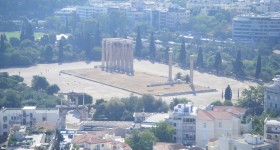Symbols in Crisis
On the night of May 30, 1941 two young men, Manolis Glezos and Apostolos Santas were wondering in Athens. By then, the city was occupied by the brutal German forces. The men avoided carefully the military patrols while they walked across Plaka, the nineteenth century neighbourhood. Their footsteps brought them at the foot of the Acropolis. The climbed carefully uphill and they headed for the top of the Sacred Rock. Without losing valuable time, they reached for the Swastica that was desecrating the space and they tore it down. You probably already know that Acropolis is the most important Greek symbol of the modern National State. Its significance was firmly established since the time Athens became the capital of the new nation in the nineteenth century. The act of tearing apart the German Swastica soon became the first act of Greek resistance during the Second World War; and the two men became its acknowledged heroes.
Manolis Glezos is, by now, a well known revolutionary, left wing politician and writer. Over the past decades he was arrested, tortured and condemned to death several times by the Germans, the Italians and (alas!) the Greeks. In his political career he counts 11 years and 4 months of imprisonment, 4 years and 6 months of exile. He escaped death in the hands of fascist and other totalitarian regimes only because of the public outcry. Today, the 88 year old is a beloved symbol of political resistance and a man who has not stopped fighting for his ideas.
Greece’s economic crisis has not left the old man untouched. Yesterday, the police attacked the protesters who took the streets in order to complain for the new economic measures. Among the protesters was Manolis Glezos who was attacked by the police forces with tear gas. He is still in the hospital recovering from his new ordeal. Despite the state of his health, and while they were transferring him to the Evangelismos, he managed to make a statement to the surrounding journalists. He said that when the police attacked him, they attacked the Citizen.
Since I heard the sad news I keep wondering. Have we lost sight of all political values over the last few decades, after the collapse of the dictatorship in 1974? Have we missed the significance of the people’s legitimate protest to seemingly unfair state decisions? Have we lost all respect not only for historical symbols but also for the Citizen who takes to the streets in order to protect himself? Maybe it is time to reevaluate our priorities. Instead of serving blindly economic doctrines, we should start cherishing again our history, our symbols and, above all, humanitarian values.


An answer to all the questions in the last paragraph: Yes, we have.
I too would like everyone to cherish history instead of economic doctrines, but you know the saying: “Money talks and…” you know the rest.